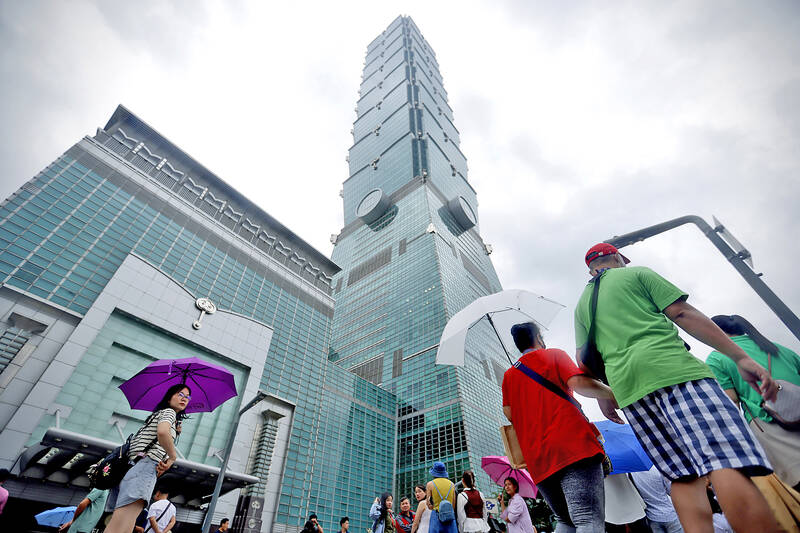Taiwan’s economy is set to stage a U-shaped recovery starting this quarter, as exports resume growth on the back of strong demand for artificial intelligence-related (AI) products and services, DBS Bank Ltd (星展銀行) said yesterday.
However, the Singaporean bank kept its forecast of Taiwan’s GDP growth unchanged at 0.5 percent for this year on grounds that consumption growth would moderate and normalize.
“We anticipate a U-shaped recovery [in Taiwan] starting from this quarter with GDP growth of 2 percent,” Singapore-based DBS Bank economist Ma Tieying (馬鐵英) told an online news conference, adding that the growth momentum would accelerate to 3 to 4 percent early next year.

Photo: Ritchie B. Tongo, EPA-EFE
The prolonged global challenges linked to smartphone and PC inventories would fade away in the second half of this year, allowing major technology brands to introduce next-generation products and attract consumers to upgrade, thus facilitating the replacement cycle, Ma said.
Furthermore, the adoption of ChatGPT is fueling investment in generative artificial intelligence (AI), leading to increased demand for high-performance graphics processing units and optimized semiconductor devices, she said.
Taiwan is well positioned to benefit from the surge in AI-related chip demand in that Taiwan Semiconductor Manufacturing Co (台積電) plays a prominent role in global advanced logic chip production, Ma said.
Exports of electronic components, information and communications products, as well as precision instruments swung to positive growth of 2.7 percent in July and August, she observed.
Specifically, shipments of information and communications products surged 48.6 percent, a hefty gain from the 3.7 percent increase seen in the second quarter, Ma said.
However, the outlook remains evasive for Taiwan’s non-tech sectors, DBS said, as exports of chemicals, metals, plastics and rubber have not shown clear signs of recovery.
China’s high debt levels would discourage rapid advances in property and infrastructure investments, which could weigh on global demand for industrial metals, construction materials and other commodities, Ma said.
In addition, consumption growth might moderate this quarter, following a V-shaped recovery in the first nine months, the economist said. The benefit of revenge consumption has largely materialized, but a resilient labor market should support consumption growth at healthy levels, she said.
DBS raised its inflation forecast for this year from an increase of 1.4 percent to 1.7 percent after the consumer price index last quarter climbed 2.4 percent, faster than expected.
The central bank is to maintain a hawkish tone while holding policy rates steady for the rest of this year and next year, Ma said.

Nvidia Corp’s demand for advanced packaging from Taiwan Semiconductor Manufacturing Co (TSMC, 台積電) remains strong though the kind of technology it needs is changing, Nvidia CEO Jensen Huang (黃仁勳) said yesterday, after he was asked whether the company was cutting orders. Nvidia’s most advanced artificial intelligence (AI) chip, Blackwell, consists of multiple chips glued together using a complex chip-on-wafer-on-substrate (CoWoS) advanced packaging technology offered by TSMC, Nvidia’s main contract chipmaker. “As we move into Blackwell, we will use largely CoWoS-L. Of course, we’re still manufacturing Hopper, and Hopper will use CowoS-S. We will also transition the CoWoS-S capacity to CoWos-L,” Huang said

Nvidia Corp CEO Jensen Huang (黃仁勳) is expected to miss the inauguration of US president-elect Donald Trump on Monday, bucking a trend among high-profile US technology leaders. Huang is visiting East Asia this week, as he typically does around the time of the Lunar New Year, a person familiar with the situation said. He has never previously attended a US presidential inauguration, said the person, who asked not to be identified, because the plans have not been announced. That makes Nvidia an exception among the most valuable technology companies, most of which are sending cofounders or CEOs to the event. That includes

INDUSTRY LEADER: TSMC aims to continue outperforming the industry’s growth and makes 2025 another strong growth year, chairman and CEO C.C. Wei says Taiwan Semiconductor Manufacturing Co (TSMC, 台積電), a major chip supplier to Nvidia Corp and Apple Inc, yesterday said it aims to grow revenue by about 25 percent this year, driven by robust demand for artificial intelligence (AI) chips. That means TSMC would continue to outpace the foundry industry’s 10 percent annual growth this year based on the chipmaker’s estimate. The chipmaker expects revenue from AI-related chips to double this year, extending a three-fold increase last year. The growth would quicken over the next five years at a compound annual growth rate of 45 percent, fueled by strong demand for the high-performance computing

TARIFF TRADE-OFF: Machinery exports to China dropped after Beijing ended its tariff reductions in June, while potential new tariffs fueled ‘front-loaded’ orders to the US The nation’s machinery exports to the US amounted to US$7.19 billion last year, surpassing the US$6.86 billion to China to become the largest export destination for the local machinery industry, the Taiwan Association of Machinery Industry (TAMI, 台灣機械公會) said in a report on Jan. 10. It came as some manufacturers brought forward or “front-loaded” US-bound shipments as required by customers ahead of potential tariffs imposed by the new US administration, the association said. During his campaign, US president-elect Donald Trump threatened tariffs of as high as 60 percent on Chinese goods and 10 percent to 20 percent on imports from other countries.